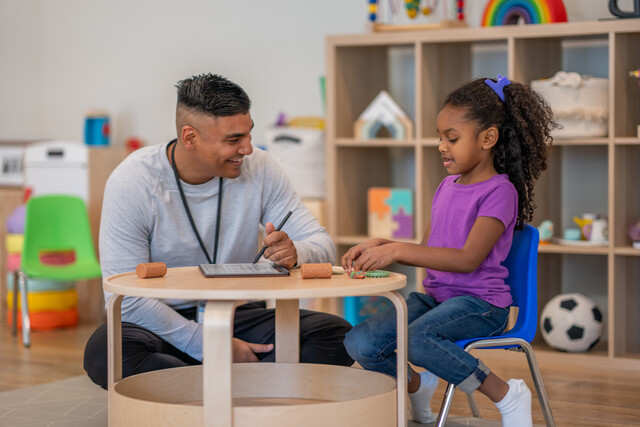For just about everyone, life is a balancing act. For single parents, it can be even more challenging. How does one keep it all together?
Following a consistent routine is important, but when you're a parent (particularly a single parent with no partner to fall back on), that's not always possible. Children have last-minute needs, become ill, or have last-minute schedule changes. Add to that the parent's own needs, illnesses, and schedule changes, and you've got a plate that's not only full, it's overflowing! This article will explore some of the balancing challenges single parents face, ways to help ease the stress, and cope with various situations.
We'll begin by discussing what children need most from a parent.
Parent or friend � what do children need most?
When children are small, parents typically play games with them, share "secrets," and provide a safe and secure confidante. As children approach their teen years, however, many parents "back off" from their friendship role and become more aloof and strict.
Many people have the idea that parents cannot be both "parent" and "friend" to their child. This is incorrect. Being both friend and parent to your pre-teen and teen child is not only possible, it's preferable for both you and your child.
In her book "Parenting Is a Contact Sport - 8 Ways to Stay Connected to Your Kids for Life", Joanne Stern, Ph.D. states there is no conflict between the roles of friend and parent; it is "a parenting myth that needs to be debunked." She goes on to say that an approachable, accessible parent who has their child's best interests at heart facilitates a close bond (friendship). Additionally, you and your child will respect one another, so discipline and boundaries are more likely to be adhered to, making things easier and less stressful for everyone.
Think back for a moment to your own teen years. Chances are, they were exciting, scary, confusing, and complicated. All your friends were as scared and confused as you were. Well, your child's peers know about as much as your child does about life. You, on the other hand, have life experience and helpful information to share. Approaching this in "parent" mode may come across as "I know better than you do." If, however, you approach your child as a friend would, empathizing and sharing experiences with one another, your child will be more likely to relax, open up, and share with you.
A friendship with your child is deeper than the friendships she or he has with peers -- for with you, there is no worry about jealousy, betrayal, or competition, and your wisdom and more mature life and decision-making skills are a great benefit.
Of course, this cannot happen overnight. Building a friendship with your child, just like cultivating a friendship with anyone else, depends on trust and consistency. You will need to establish trust by being consistent and non-judgmental, starting as soon as possible.
As you can imagine, developing a strong friendship with your children is even more important when you're a single parent. Since it's just "you and the kids," it's important that the family work together as a team, and friendship between single parent and child greatly assists this process.
Work and the single parent
Chances are, if you're a single parent, you are also the main (or sole) support for the family. As discussed in previous lessons, about 40 percent of single-parent families live in poverty, and most receive some type of assistance (e.g. food programs, welfare, medical coverage). Many of these parents work outside the home.
In an ideal situation, the non-custodial parent helps meet the child's needs, including handling emergencies and changes in schedule. Unfortunately, most single parents don't have that luxury and must come up with their own strategies for dealing with unexpected situations.
Currently, the U.S. government's only federal family-friendly act is the U.S. Family and Medical Leave Act (FMLA); however, that only guarantees 12 weeks of unpaid leave for the birth or adoption of a child, or other family or personal medical reasons. Additionally, this act only applies to employers who have a payroll of 50 or more employees. That's not a great deal of help for single parents on a day-to-day basis.
Since single-parent household numbers are increasing, family-friendly workplaces have developed policies to help single parents work, as well as deal with emergencies. Perhaps the best family-friendly "perk" a company can offer is free or low-cost in-house daycare, but it is uncommon, due to the expense and legal requirements of running a daycare. For these reasons, companies who offer in-house daycare are almost always large corporations.
More common is flex-time, where an employer allows the employee the ability to work varied hours during the week, as long as all hours required are completed by week's end. The employer may give the employee a set of options to choose from, or may allow the employee to design their own schedule.
Another flexible work situation is job sharing. In this scenario, two people share the same job (both working part-time), allowing them time to meet their responsibilities at home, while still retaining employment. Some employers also allow a permanent or temporary switch from full-time to part time, allowing the single parent time to attend to the children, while still maintaining their position in the company.
Perhaps the best family-friendly policy is telecommuting. Unfortunately, this works with a limited number of jobs � those where the individual can work independently, such as drafting, writing, or computer coding. Other fields, such as virtual administration support and virtual computer support, are becoming more popular and can be excellent fields for single parents.
Other family-friendly company policies may include parental leave, which is an option for a parent who needs a day or afternoon off to care for a sick child, or attend a school event. Flexible emergency leave is similar; such leave is typically a set number of days (aside from vacation days) an employee can draw upon during the year to take time off for emergencies, medical or otherwise.
Some employers provide a family-friendly atmosphere by allowing employees to bring children with them to work, if needed, (when the babysitter is ill, for example), or hosting family-friendly events for the staff and their families -- like holiday parties and picnics.
Other benefits may include generous healthcare packages (or on-site facilities) for employees and their family members; or a company may offer scholarships, tuition, or low-cost student loans as benefits.
Managing your emotional responses
Some days, it seems as though nothing can go right. The alarm doesn't go off, the kids aren't cooperating, breakfast was burned, you're out of coffee, and you're late for work. As a single parent, all the responsibility is on you, and you're about to lose your cool.
Sound familiar? Rest assured, you are not alone. In this section, we'll discuss managing your emotional responses to overwhelming situations.
The first, and largest, "monster in the closet" of emotional triggers is stress. The "stress monster" likes to incite other monsters (fatigue, impatience, overwork, overwhelm) to help shorten your fuse and make you want to explode. Many of the techniques for releasing stress will be covered in the lesson on self-care; for now, we'll focus on immediate fixes for hectic situations.
The simplest, yet sometimes most difficult thing to do when upset is take a deep breath - but that is precisely what you need to do. The American Institute of Stress (AIS) in Fort Worth, TX, on their daily life blog (8/10/12), states that proper breathing is a "mentally active process that leaves the body relaxed, calm, and focused." They suggest practicing deep (abdominal) breathing for 20 to 30 minutes each day; however, if you aren't able to allot a daily block of time for breathing practice, even a few moments of proper deep breathing throughout the day can relieve stress and anxiety. Deep breathing increases the oxygen supply to the brain, which also helps you think more clearly.
Dr. Herbert Benson, AIS Fellow and Founding Trustee, has coined the term "relaxation response" to describe "a physical state of deep rest that changes the physical and emotional responses to stress ... decreases in heart rate, blood pressure, rate of breathing, and muscle tension." Breathing is the key to initiating the response.
When you feel ready to give the world a "time out," give yourself a time out instead - take a slow, deep breath, all the way into your diaphragm, then let it out slowly. Do this several times until you feel calmer and more relaxed. At first, it may be difficult to ignore the chaos surrounding you, but taking the time to do this simple exercise can make you feel better, and the day go much more smoothly. This technique works any time you feel stressed or overwhelmed, not just when the children are acting up. It's a good, simple technique that's easy to master with only a little practice.
Other quick calming techniques include counting (either backwards or forwards), leaving the room, or taking a short walk outside to clear your head.
Your social life (with and without the children)
Despite what you may believe, single parents do need a social life. Actually, they need two � one that involves the children and one that does not.
Many parents, especially single parents, feel guilty taking even a small amount of time for themselves, or yearning for a break from their children. Wanting some time for yourself does not make you a selfish person � it makes you human! We all need some down time, single parents perhaps, most of all.
One of the more common, yet not necessarily favorite, parent/child socializing activity is the children's party. Typically, it is a child's birthday party attended by the child's friends and the friend's parents. Activities and refreshments are geared toward the children; adults socializing is possible, but not the focus of the gathering. In other words, the gathering is really for the kids; parental attendance is usually supervisory or incidental.
Family parties or gatherings are geared toward both adults and children, with activities for a variety of age groups. These parties can be arranged by groups of friends, family members, individuals, church groups, or community organizations. Family events typically have various menus, games, play areas, and relaxation areas so both parent and child can fully enjoy the party. Local fairs also offer a wide range of activities and are a good choice for a family outing. Community "street fairs" are usually cost-free to visit (food, beverages, and trinkets cost, the music is usually cost-free) but county fairs can be surprisingly expensive. It is advisable to check not only entrance ticket prices, but concession, ride, and exhibit/show prices, as well, and add up the expense beforehand to ensure an outing to a county fair won't be too costly.
Sometimes, every parent needs a "grown-up" gathering, no children involved. As mentioned previously, it is completely natural to want � and need � some "grown-up" time. This may be truer for single parents, who have no adult partner at home to share the day's trials with, so it's important to get out and mingle with "adults only" once in a while. (The key is once in a while. Grown-up time must not become more important than the children or cause a parent to neglect their child.)
The most "grown-up time" activity of all is dating. When a couple begins dating, the dates usually take place during the evenings. As the couple gets to know one another, they will have day outings, as well. (If a dating relationship becomes serious, daytime outings will likely begin to include the children. We'll explore that aspect of dating in following lessons.) It is important for single parents to allow themselves the opportunity to date, without letting it interfere with their care of, and attention to, the children.
How to NOT burn out your friends and family with requests
When you're a busy single parent, you sometimes don't realize how much you rely on members of your support network. Even if Grandma loves babysitting the grandchildren, she may have plans of her own the day you drop in, which she will likely cancel immediately to care for the children, even if it upsets her to do so. Assuming one can leave the kids with Grandma at any time, unannounced, can end up causing resentment, hard feelings, and guilt. How does one avoid burning out the members of their support network, especially if that network is small?
Ideally, one should continuously be looking to build and strengthen their support network. Not all members of a support network can be called upon for everything; for example, some supporters may be fine with babysitting, while others are more suited to running errands or shepherding the children from school to a supervised activity. Some may be sounding boards � individuals you can call and tell your troubles to, who will empathize. Still others may be single parents in your social circle � perhaps you take turns with them, or combine babysitting duties or errands for everyone's benefit. Finding more people for your support network can be a daunting task, and indeed, it takes a bit of mettle to seek out new contacts. As we grow older, it becomes more difficult for us to make friends, so if you wish to make new friends, you must go where like-minded people are. (If you're a single parent, this will probably not be the local tavern!) Joining groups for single parents, or participating in local church or community activities are all excellent ways to meet other single parents, share ideas, and learn about resources for you and your child.
There are also many programs designed to assist single parents with child care, networking, emotional support, and family-friendly events. Many cities have after-school "at-risk child" programs to keep kids occupied, off the street, and out of trouble. These programs vary by area, so check your city or county website or local bulletins for organizations. Many are specifically geared toward children of single-parent families living in poverty and include a snack or meal, as well as after-school learning activities for the children.
Other coping skills
Perhaps the best coping skill is this: Forgive yourself for not being "Super-Parent." If the living room is messy and unexpected company arrives, too bad for them if they don't like it. If all you have the energy to make for dinner is corn flakes, so be it. If your strategy for getting to bed at a decent hour on weeknights includes letting older children make dinner or babysit the younger ones occasionally, that's a perfectly acceptable way to take care of necessary chores and teach your children responsibility at the same time (not at the expense of their schoolwork, of course).
It's also helpful to remember that needing, asking for, and accepting help does not make you a weak or ineffectual person or a "bad" parent. Everyone needs help with things now and again, whether it's something as simple as moving a sofa or something more involved, such as babysitting the children. Don't be afraid to ask for help; more importantly, when help is offered, accept it. Refusing due to pride or false bravado benefits no one.
If possible, single parents should create "backup plans" for emergency situations. Use a variety of support networks, especially community services, such as discount (or free) transportation for you or your child, swimming or sports lessons, or supervised after-school groups or programs. Some communities have car-pool or ride sharing websites, or van pooling services available for little or no cost.

























